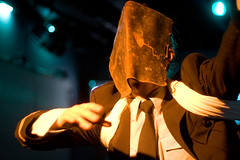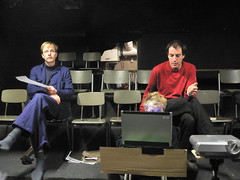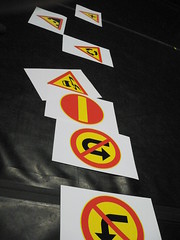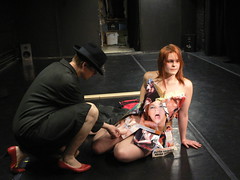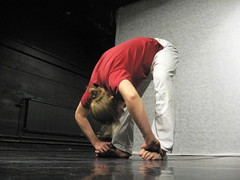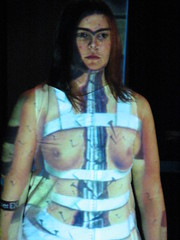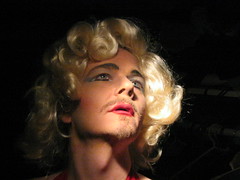- pick up one of the cloths if no monkey blindfold
- tie yr damn shoelaces
- he's got a gun
- monkeys keep going, back to suitcase wild energy
- exit on humiliation
- cleaning
- no scissor gesture
- black is the colour immediately. no flowers
- bang them in the water
- silent emergency
- ophelia drowning fixed by going back w/ weight, turning R leg out, hands frozen out. sit on L leg
- just open the baby
- suitcase malfunctions
- davide needs a finger for akseli
Showing posts with label davide. Show all posts
Showing posts with label davide. Show all posts
Thursday, March 29, 2007
Merde
It's opening night. I just picked up my notebook and thought, because every once in a while I can be frivolous, I'd share some of my notes from the last two runthroughs. Apparently I need to remember:
Labels:
acting,
akseli,
davide,
devising,
here speaks elektra,
juha,
performance,
theatre
Saturday, February 17, 2007
Six weeks to Elektra
"This is your captain speaking...
I forgot what I was going to say."
So we're working now, about seven hours a day including break, until the show opens. The material is starting to gather form but it's still loose enough that anything can happen, and still doubtful enough to throw us (actors, probably director too but he doesn't show it so much in front of us) into wild rants of wtf are we doing here. This is like: the joy of devising.
Some of our elements include:
The previous week was our last "workshop" session, tomorrow marks the end of our first week of rehearsals proper. During the workshops I still had a day where I felt absolutely awful about the whole project (for reasons that are not clear even to me), but it seems that the feeling was some kind of entity itself, hanging around in the cellar air and infecting each one of us one day at a time. I have a feeling it's again just one's own artistic fear or ego or what-not making a mountain out of a molehill, where you start to question what the hell you're doing in this project and why does it have to, have to be that way when this way would be far superior, &c. I suspect what's really going on in times like those is that you just really, really secretly want the show to be great and you're building up an arsenal of excuses in case it isn't, so you won't have to go anywhere near your own personal soul's worth when your heart breaks. Maybe that's extreme. Well. It's been part of this process for sure. But this week's been an absolute giggle-fest (from hell, from Davide's POV sometimes). We've got comedy coming out the wazoo, and the project is so much fun it barely feels like Elektra.
But a porn dress! How do you go wrong? Aside from the fact that I can't really move in it and that we need to build a new one every night, you can't go wrong at all!
At the moment the way we work is that the first hour is warmup and training exercises, which are either led by me (biomechanics and working on the etude) or Juha (afro warmup plus his choreography based on movements from our old show), plus a wee bit of work on singing. This is really hard to get through in an hour; I usually find that once you've warmed up the brain and the body sufficiently to do an etude at all, you've got ten minutes left. Which ten minutes, if you know the etude really well, is kinda sufficient since you'll kill yourself if you do it more than thrice in quick succession, but we're still hashing out the shifts of weight and the exact body positions, so it's a bit harried.
Oh, rewind. What's an etude? To make it an extremely short story, it's a training sequence developed for actors, in a similar vein as a kata would be in karate training: an exact sequence of movements to be executed over and over again, striving towards their perfection (which, being impossible, let's just say their improvement). You wouldn't ever use a kata in a fight: you would apply the principles you learn in it. It's the same with a biomechanical etude: you study the etude to learn, very deeply, the principles of balance, weight, mime, rhythm, breath, sensitivity, precision, and visual interest. It's not an aesthetic; it's like a barbell for your actor's body.
The shitty thing about studying biomechanics right now is that there's only a handful of people who teach it, a handful of people who use it, and they're really not in Finland at the moment. So unless I have time and money to travel to a workshop, it's kind of a self-study thing. The really brilliant thing about that is that with Juha and Akseli especially, I've taught them all I know and have quickly come to the end of my expertise, and so doing things like creating etudes for ourselves is an incredibly valuable way to challenge the principles.
And challenging the principles is, like, ridiculous. Here we are, four grown people arguing about the precise angle of a shoulder in a movement called "presenting the passport," and the angle of the shoulder really matters. Or we come up with a brillant movement only to analyze it and discover it's actually two movements, so in the interests of efficiency we have to modify its brilliant self. Or spending twenty minutes on whether a foot should be off the ground or not, and really going at it with ruthless logic. You learn an awful lot that way. So that's keeping me pretty darn happy, although you also have to truncate your learning somewhat when you're in a rehearsal situation where you actually have to produce some kind of show.
I think the fastest I've ever led the warmup was 30 minutes, and I pulled a leg muscle that day. It's amazing how long it takes us. On the other hand, we do have a lot of bits in the show so far where the idea is to push a movement beyond our capacity: to work towards complete loss of power or balance, for instance, and that requires pretty much going all out in a way that spells instant injury if your body isn't prepped like a greased pig. The choreography we made with traffic symbols is one of these. We created movements corresponding to the signs, but the movements had to be too difficult to perform properly every time—more like you stick it once every ten tries. While the movements themselves can be quite pretty, what's way, way more compelling to watch is the look on the actor's face as they will every cell in their body towards stability in a given impossible position, and it's fabulously entertaining when they crash.
What that has to do with drama per se, I can't really say. We're wondering ourselves what the dramaturgical topography is like in Here speaks Elektra, and not so much even like are we looking at a relief map or a political map or whatnot, but what the hell hemisphere is this? Is it drama, theatre, performance art, dance, dance theatre, physical theatre, does it matter as long as you can hold it together? Can you hold it together if you don't really know what it is?
By the way: we finally got a grant. Like, our first real one. We are unbelievably happy about this.
I forgot what I was going to say."
So we're working now, about seven hours a day including break, until the show opens. The material is starting to gather form but it's still loose enough that anything can happen, and still doubtful enough to throw us (actors, probably director too but he doesn't show it so much in front of us) into wild rants of wtf are we doing here. This is like: the joy of devising.
Some of our elements include:
- airports
- choreography to music as well as to traffic symbols
- a made-up biomechanical training etude called "emergency at the airport," which needs work
- a problem in dealing with stylized vs quotidien movement (i.e. when to use which and whether combining both at all will work)
- spanish tragicomedy (which is sorta like commedia pre-masks)
- a dress made out of a porn mag
- great electro soundtracks created from such sources as purring cats and a washing machine
- images, images, images, images... taped on the body, projected on the body or the set, taped to the wall; they're a total mess
- objects, objects, objects... another logistical mountain. What do you do with all the objects when you finish with them? Every single thing needs a solution. I now understand what I had thought was just a rather trendy "gradual pile-up of complete mess" stage design that seemed to be in a lot of shows that have a kind of kinship with performance art as well as theatre; they save themselves the headache of finishing with the objects.
- the order to develop a combined biomechanics and afro-dance warmup (!)
- seriously, these things just pile up
- The line "before rising to a new level of humanity, please read all instructions and comply with them"
- many beautiful moments and a lot of cheesy ones that need to (perhaps) settle into their stereotypes even deeper so they can become beautiful too
- Not really a clue as to what the costumes or staging are like
The previous week was our last "workshop" session, tomorrow marks the end of our first week of rehearsals proper. During the workshops I still had a day where I felt absolutely awful about the whole project (for reasons that are not clear even to me), but it seems that the feeling was some kind of entity itself, hanging around in the cellar air and infecting each one of us one day at a time. I have a feeling it's again just one's own artistic fear or ego or what-not making a mountain out of a molehill, where you start to question what the hell you're doing in this project and why does it have to, have to be that way when this way would be far superior, &c. I suspect what's really going on in times like those is that you just really, really secretly want the show to be great and you're building up an arsenal of excuses in case it isn't, so you won't have to go anywhere near your own personal soul's worth when your heart breaks. Maybe that's extreme. Well. It's been part of this process for sure. But this week's been an absolute giggle-fest (from hell, from Davide's POV sometimes). We've got comedy coming out the wazoo, and the project is so much fun it barely feels like Elektra.
But a porn dress! How do you go wrong? Aside from the fact that I can't really move in it and that we need to build a new one every night, you can't go wrong at all!
At the moment the way we work is that the first hour is warmup and training exercises, which are either led by me (biomechanics and working on the etude) or Juha (afro warmup plus his choreography based on movements from our old show), plus a wee bit of work on singing. This is really hard to get through in an hour; I usually find that once you've warmed up the brain and the body sufficiently to do an etude at all, you've got ten minutes left. Which ten minutes, if you know the etude really well, is kinda sufficient since you'll kill yourself if you do it more than thrice in quick succession, but we're still hashing out the shifts of weight and the exact body positions, so it's a bit harried.
Oh, rewind. What's an etude? To make it an extremely short story, it's a training sequence developed for actors, in a similar vein as a kata would be in karate training: an exact sequence of movements to be executed over and over again, striving towards their perfection (which, being impossible, let's just say their improvement). You wouldn't ever use a kata in a fight: you would apply the principles you learn in it. It's the same with a biomechanical etude: you study the etude to learn, very deeply, the principles of balance, weight, mime, rhythm, breath, sensitivity, precision, and visual interest. It's not an aesthetic; it's like a barbell for your actor's body.
The shitty thing about studying biomechanics right now is that there's only a handful of people who teach it, a handful of people who use it, and they're really not in Finland at the moment. So unless I have time and money to travel to a workshop, it's kind of a self-study thing. The really brilliant thing about that is that with Juha and Akseli especially, I've taught them all I know and have quickly come to the end of my expertise, and so doing things like creating etudes for ourselves is an incredibly valuable way to challenge the principles.
And challenging the principles is, like, ridiculous. Here we are, four grown people arguing about the precise angle of a shoulder in a movement called "presenting the passport," and the angle of the shoulder really matters. Or we come up with a brillant movement only to analyze it and discover it's actually two movements, so in the interests of efficiency we have to modify its brilliant self. Or spending twenty minutes on whether a foot should be off the ground or not, and really going at it with ruthless logic. You learn an awful lot that way. So that's keeping me pretty darn happy, although you also have to truncate your learning somewhat when you're in a rehearsal situation where you actually have to produce some kind of show.
I think the fastest I've ever led the warmup was 30 minutes, and I pulled a leg muscle that day. It's amazing how long it takes us. On the other hand, we do have a lot of bits in the show so far where the idea is to push a movement beyond our capacity: to work towards complete loss of power or balance, for instance, and that requires pretty much going all out in a way that spells instant injury if your body isn't prepped like a greased pig. The choreography we made with traffic symbols is one of these. We created movements corresponding to the signs, but the movements had to be too difficult to perform properly every time—more like you stick it once every ten tries. While the movements themselves can be quite pretty, what's way, way more compelling to watch is the look on the actor's face as they will every cell in their body towards stability in a given impossible position, and it's fabulously entertaining when they crash.
What that has to do with drama per se, I can't really say. We're wondering ourselves what the dramaturgical topography is like in Here speaks Elektra, and not so much even like are we looking at a relief map or a political map or whatnot, but what the hell hemisphere is this? Is it drama, theatre, performance art, dance, dance theatre, physical theatre, does it matter as long as you can hold it together? Can you hold it together if you don't really know what it is?
By the way: we finally got a grant. Like, our first real one. We are unbelievably happy about this.
Labels:
acting,
akseli,
biomechanics,
davide,
devising,
here speaks elektra,
juha,
meyerhold,
naamio ja höyhen,
performance,
rehearsal,
theatre,
warmup,
workshop
Monday, December 04, 2006
You're projecting, Frida
Careful what you ask for as an actor.
I mean, of course yeah careful what you as for as a human being, but anyway and but so. I was getting driven round the bend by the fact that I've been playing with Hamletmaschine for three years in a more than just casual fashion; it's a like 10-page script, and still I think I'm not much closer than I was at the beginning to figuring out what it's about. So last night I sat down and tried to think through what the question is. What's the problem, the experiment at the heart of Hamletmaschine, but also the rest of the work we're doing on Elektra, which so far includes:
And like a whole bunch of other things too. But I started wondering what exactly is the question we're looking for, the problem that we can try to solve. The point for me isn't to solve the problem, but to work with it and deepen our understanding of it as well as the audience's understanding. As in, if you make a show about rape, it's not so interesting to me to shock the audience, upset them or any of those things for their own sake (or even to show rape on stage), but you should be studying the phenomenon and its underlying societal assumptions/consequences and working for a deeper understanding, which to me is worth going to the theatre for. For our work I rather liked the question How much can you take? as in What exactly can you tolerate?
Can anyone say they know exactly what they will and will not tolerate? Is there a difference between tolerate and condone? If you were aware of all the daily things that happen that you would classify as intolerable and still you let them go by without blinking an eye, would that drive you crazy? Hamlets and Ophelias, in Müller's text, do pretty much just that. But it is a good question: how much are you willing to put up with? To yourself and to others? And do you really want to know exactly what you ARE putting up with right now? When something is intolerable, what do you do? Do you do nothing? Why do you do nothing? Maybe you can take more pain, injustice, and humiliation than you would really like to think.
So anyway I ended up writing this text (it basically looks like much of the above, only about ten times as long), which was just a free-for-all on the idea of tolerating, and it went over pretty well at rehearsal today. I'm happy because it relates directly to the text (although it's not the only thing you'll find there by any means), but it is also easily transferable to our physical work, because we are pushing each other to many different limits, either in exertion, or discomfort, or humiliation, which means we're all really really really good friends now, us. But so anyway I read the text out loud and Davide says "That's really nice. Can you memorize it for Wednesday?" Hell, that's 72 hours or something like that. Sure. God, it's long.
Process is a good thing, plus projecting stuff
So now we're starting to get into a pattern for our work, which is good. This time we work usually six hours, sometimes four.
First we have about 30 minutes physical warmup (running and a particular viewpoints running exercise, then enough stretching to get everything ready to work), then about a half hour rhythm exercise I developed out of a biomechanics training.
In the exercise you start by moving by yourself, making an audible rhythm with your movement on the floor by hitting with your feet and hands, trying to put your weight on feet and hands with equal frequency which means lots of cartwheely stuff (or more like trying-to-do-cartwheely stuff). Once you have your rhythm, you can play with it. Then someone gets on a drum and beats out something very, very simple. Spend about five minutes just moving to and around this rhythm, embellishing it and playing with sub-phrases in the basic rhythm but getting it into your system. Then the drum stops and the task is now, as a group, to continue the rhythm and only the rhythm, so you make noise when you hit the floor, but you only make noise where the basic rhythm is. This limitation is quite challenging for the first 3 or 4 times. Now we're getting the hang of it, so we're going to be adding more limitations and variations (kinds of movement, more emphasis on the hands than feet, silence and rhythm, using partners) to keep it pushing forward.
After that hour, Davide leads another hour of vocal work, usually starting with an exercise to acquaint yourself with 7 resonators (they correspond to 7 chakras; although in English theatre training I'm used to working with 6 resonator sounds and the seventh one is a really, really French swallowed-nasal cross between "ah" and "uh" so I kind of privately call this the French vocal warmup), followed by a period of working with improvised sound and movement. Then there's this exercise Davide invented; we call it the aquarium, and let's just say for now that it's also improvised sound and movement, but with a heavy emphasis on body part isolation and articulation, i.e. mime skills. So after the first two hours we've gotten pretty sweaty and are throwing around our bodies and voices pretty freely. It's wonderful, though, to repeat the same exercises over and over and watch the work deepen so quickly. Breakthroughs at this point are fast and furious, and that feels really, really good.
The next two to four hours are material-building. Today Virpi brought in the photos, and we worked with projecting them on a screen (hm), then on white costumes (hm), and then finally Akseli said it should really just be naked skin, and all of a sudden the images look like we might be able to use them. I mean, they're images of torture, of humiliation, they're news images. They're really awful, and whenever we've tried to work with them the actors just get completely upstaged and it's so heavy-handed. But projecting Abu Ghraib images on skin has some potential. Somehow referring to the body so strongly opens the images up; it brings some new quality to the body and to the image, and that could be strong. Plus if you're wearing a projection, you feel like you're sorta wearing something, but in a pleasing kind of naughty way.
And then, after closing the slideshow, the old theatre computer's screen saver came on: this image of Frida Kahlo's Broken Column. Akseli was standing in front of it, and all of a sudden he stepped to the place where his face and Frida's face were merging into one face, and it was mesmerizing. So we may have found something else that will work, thank you Frida.
I mean, of course yeah careful what you as for as a human being, but anyway and but so. I was getting driven round the bend by the fact that I've been playing with Hamletmaschine for three years in a more than just casual fashion; it's a like 10-page script, and still I think I'm not much closer than I was at the beginning to figuring out what it's about. So last night I sat down and tried to think through what the question is. What's the problem, the experiment at the heart of Hamletmaschine, but also the rest of the work we're doing on Elektra, which so far includes:
- [Meyerhold's] Biomechanics training (me)
- Mask/Mime/Puppets/Objects (Davide)
- Dance/Choreography (Juha's choreography)
- Singing/Music/Rhythm/Vocal sound
- Tableaux
- Heiner Müller's text
- Ancient chorus, based on Lecoq training (Davide)
- Ofeliakone/Opheliamachine
- Humiliation
- Dominant/Dominated
- The Spanish Tragicomedy [Commedia dell'Arte precursor]
- Spontaneous performance art
- Video projections
- Torture
And like a whole bunch of other things too. But I started wondering what exactly is the question we're looking for, the problem that we can try to solve. The point for me isn't to solve the problem, but to work with it and deepen our understanding of it as well as the audience's understanding. As in, if you make a show about rape, it's not so interesting to me to shock the audience, upset them or any of those things for their own sake (or even to show rape on stage), but you should be studying the phenomenon and its underlying societal assumptions/consequences and working for a deeper understanding, which to me is worth going to the theatre for. For our work I rather liked the question How much can you take? as in What exactly can you tolerate?
Can anyone say they know exactly what they will and will not tolerate? Is there a difference between tolerate and condone? If you were aware of all the daily things that happen that you would classify as intolerable and still you let them go by without blinking an eye, would that drive you crazy? Hamlets and Ophelias, in Müller's text, do pretty much just that. But it is a good question: how much are you willing to put up with? To yourself and to others? And do you really want to know exactly what you ARE putting up with right now? When something is intolerable, what do you do? Do you do nothing? Why do you do nothing? Maybe you can take more pain, injustice, and humiliation than you would really like to think.
So anyway I ended up writing this text (it basically looks like much of the above, only about ten times as long), which was just a free-for-all on the idea of tolerating, and it went over pretty well at rehearsal today. I'm happy because it relates directly to the text (although it's not the only thing you'll find there by any means), but it is also easily transferable to our physical work, because we are pushing each other to many different limits, either in exertion, or discomfort, or humiliation, which means we're all really really really good friends now, us. But so anyway I read the text out loud and Davide says "That's really nice. Can you memorize it for Wednesday?" Hell, that's 72 hours or something like that. Sure. God, it's long.
Process is a good thing, plus projecting stuff
So now we're starting to get into a pattern for our work, which is good. This time we work usually six hours, sometimes four.
First we have about 30 minutes physical warmup (running and a particular viewpoints running exercise, then enough stretching to get everything ready to work), then about a half hour rhythm exercise I developed out of a biomechanics training.
In the exercise you start by moving by yourself, making an audible rhythm with your movement on the floor by hitting with your feet and hands, trying to put your weight on feet and hands with equal frequency which means lots of cartwheely stuff (or more like trying-to-do-cartwheely stuff). Once you have your rhythm, you can play with it. Then someone gets on a drum and beats out something very, very simple. Spend about five minutes just moving to and around this rhythm, embellishing it and playing with sub-phrases in the basic rhythm but getting it into your system. Then the drum stops and the task is now, as a group, to continue the rhythm and only the rhythm, so you make noise when you hit the floor, but you only make noise where the basic rhythm is. This limitation is quite challenging for the first 3 or 4 times. Now we're getting the hang of it, so we're going to be adding more limitations and variations (kinds of movement, more emphasis on the hands than feet, silence and rhythm, using partners) to keep it pushing forward.
After that hour, Davide leads another hour of vocal work, usually starting with an exercise to acquaint yourself with 7 resonators (they correspond to 7 chakras; although in English theatre training I'm used to working with 6 resonator sounds and the seventh one is a really, really French swallowed-nasal cross between "ah" and "uh" so I kind of privately call this the French vocal warmup), followed by a period of working with improvised sound and movement. Then there's this exercise Davide invented; we call it the aquarium, and let's just say for now that it's also improvised sound and movement, but with a heavy emphasis on body part isolation and articulation, i.e. mime skills. So after the first two hours we've gotten pretty sweaty and are throwing around our bodies and voices pretty freely. It's wonderful, though, to repeat the same exercises over and over and watch the work deepen so quickly. Breakthroughs at this point are fast and furious, and that feels really, really good.
The next two to four hours are material-building. Today Virpi brought in the photos, and we worked with projecting them on a screen (hm), then on white costumes (hm), and then finally Akseli said it should really just be naked skin, and all of a sudden the images look like we might be able to use them. I mean, they're images of torture, of humiliation, they're news images. They're really awful, and whenever we've tried to work with them the actors just get completely upstaged and it's so heavy-handed. But projecting Abu Ghraib images on skin has some potential. Somehow referring to the body so strongly opens the images up; it brings some new quality to the body and to the image, and that could be strong. Plus if you're wearing a projection, you feel like you're sorta wearing something, but in a pleasing kind of naughty way.
And then, after closing the slideshow, the old theatre computer's screen saver came on: this image of Frida Kahlo's Broken Column. Akseli was standing in front of it, and all of a sudden he stepped to the place where his face and Frida's face were merging into one face, and it was mesmerizing. So we may have found something else that will work, thank you Frida.
Labels:
davide,
devising,
here speaks elektra,
lecoq,
naamio ja höyhen,
rehearsal,
theatre,
training,
workshop
Wednesday, November 29, 2006
Here speaks Elektra, vol.II
Today's fun and games is the second round of workshops for Here speaks Elektra, an upcoming project at Naamio ja Höyhen with myself, Akseli Aittomäki and Juha Sääski on stage; Davide Giovanzana directing, and also including Virpi Byring, Maura Korhonen, and other designers in the mix; we haven't worked with everyone yet. It's an extension of the work we did for Opheliamachine way back in 2005, which means that it's based on ancient Greek chorus and Heiner Müller's Die Hamletmaschine, and this time we've shrunk the chorus and are looking more at the fifth act of HM; which begins with the line "Hier spricht Elektra." We've been focusing on ideas such as humiliation, torture, domination, and all kinds of stuff that makes you feel good at the end of the day.
Here's probably the most disturbing character I've ever met: Juha as Hamlet (as from die Hamletmaschine) who wants to be a woman. We just did some solo and duo work today with Davide, and my Ophelia/Gertrude had a hell of a time dealing with this bastard. Or rather, the disturbance was as much from O/G's inability to fight back as much as any aggression from Hamlet. Hamlet, in HM, wants to be a woman. An interpretation of this could be that he's systematically trying to rid himself of the parts that cause aggression, fighting, evil, and suffering. He ends up wanting to be a machine, with no pain, no thoughts. So we first had a fantastic dance from Juha here, alternating between war-waging, all-fucking movements and the delicate dance of a tragic lady Blanche. It was great; when he was masculine, I saw a man dressed in a woman's clothes. When he played feminine, I saw a woman dressed in a man's body. The clothes, I'm beginning to think, are a terribly important factor in an actor's (a person's?) psychology.
In Hamletmachine, Hamlet rapes his mother in a particularly brutal bunch of lines in the first act; or rather he talks about it but whether or not he actually does it is a matter of direction. He's little more than the embodiment of an uncontrollable violent urge, which is something I understood better after improvising with him today. And to me, Ophelia and Gertrude don't have physical power. It's just not part of my imagination of them. I've also never played a character who really couldn't just punch anybody's lights out (at least in a play where that kind of situation arises), so after improvising and basically having my character mocked and thrown about and mimed-violated, having no idea in my head at all where my supposed maternal/feminine power was supposed to be coming from and whether or not it could possibly hold any currency whatsoever against a Hamlet in this mood, I felt really distressed.
I've often been one of those actors who makes fun of actors who talk about their feelings a lot, but if you're a performer, you do work with them very closely from time to time and you do need to take your emotional responses seriously. You have to be able to step back and realize that you're not psychotic, depressed, angry, or a sex maniac, but your character is, and there is a difference. Sometimes it's easy to confuse your personality with a fantasy you've created. This is why some actors are (famously, almost cliched in a way) nervous wrecks.
The distress I felt comes not from anything that happened to me in the improvisation, but from some kind of weird empathy; the possibility that that situation could exist. Maybe not even for me, but for some woman (or man) somewhere. All the same, we experience emotions as if that thing has happened to us; we don't have any way of separating character-induced emotions from real life emotions, save the faculty to step back and analyse which one is which. The feeling of absolute powerlessness is very, very bad. It's also a very easy starting point for beautiful expression, because you simply cannot do anything, you have no effect on anyone, and the expression comes so easily because it cannot try to do or be anything other than itself. Loaded with powerlessness, a gesture can be wonderful.
What will be nice in the future is to see how Ophelia/Gertrude will turn this around, how the same powerless character will be able to hold all the cards over psycho-Hamlet. I'm not exactly sure how this is going to work, but I'm sure it should happen. She has something Hamlet will never have, and Hamlet wants that something.
Here's probably the most disturbing character I've ever met: Juha as Hamlet (as from die Hamletmaschine) who wants to be a woman. We just did some solo and duo work today with Davide, and my Ophelia/Gertrude had a hell of a time dealing with this bastard. Or rather, the disturbance was as much from O/G's inability to fight back as much as any aggression from Hamlet. Hamlet, in HM, wants to be a woman. An interpretation of this could be that he's systematically trying to rid himself of the parts that cause aggression, fighting, evil, and suffering. He ends up wanting to be a machine, with no pain, no thoughts. So we first had a fantastic dance from Juha here, alternating between war-waging, all-fucking movements and the delicate dance of a tragic lady Blanche. It was great; when he was masculine, I saw a man dressed in a woman's clothes. When he played feminine, I saw a woman dressed in a man's body. The clothes, I'm beginning to think, are a terribly important factor in an actor's (a person's?) psychology.
In Hamletmachine, Hamlet rapes his mother in a particularly brutal bunch of lines in the first act; or rather he talks about it but whether or not he actually does it is a matter of direction. He's little more than the embodiment of an uncontrollable violent urge, which is something I understood better after improvising with him today. And to me, Ophelia and Gertrude don't have physical power. It's just not part of my imagination of them. I've also never played a character who really couldn't just punch anybody's lights out (at least in a play where that kind of situation arises), so after improvising and basically having my character mocked and thrown about and mimed-violated, having no idea in my head at all where my supposed maternal/feminine power was supposed to be coming from and whether or not it could possibly hold any currency whatsoever against a Hamlet in this mood, I felt really distressed.
I've often been one of those actors who makes fun of actors who talk about their feelings a lot, but if you're a performer, you do work with them very closely from time to time and you do need to take your emotional responses seriously. You have to be able to step back and realize that you're not psychotic, depressed, angry, or a sex maniac, but your character is, and there is a difference. Sometimes it's easy to confuse your personality with a fantasy you've created. This is why some actors are (famously, almost cliched in a way) nervous wrecks.
The distress I felt comes not from anything that happened to me in the improvisation, but from some kind of weird empathy; the possibility that that situation could exist. Maybe not even for me, but for some woman (or man) somewhere. All the same, we experience emotions as if that thing has happened to us; we don't have any way of separating character-induced emotions from real life emotions, save the faculty to step back and analyse which one is which. The feeling of absolute powerlessness is very, very bad. It's also a very easy starting point for beautiful expression, because you simply cannot do anything, you have no effect on anyone, and the expression comes so easily because it cannot try to do or be anything other than itself. Loaded with powerlessness, a gesture can be wonderful.
What will be nice in the future is to see how Ophelia/Gertrude will turn this around, how the same powerless character will be able to hold all the cards over psycho-Hamlet. I'm not exactly sure how this is going to work, but I'm sure it should happen. She has something Hamlet will never have, and Hamlet wants that something.
Labels:
davide,
devising,
here speaks elektra,
juha,
naamio ja höyhen,
perversity,
rehearsal,
theatre
Subscribe to:
Posts (Atom)
